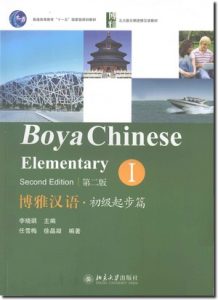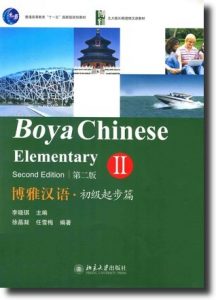How Parents Help Your Children Choose a Foreign Language?

"Learn Chinese language, Our customized Chinese courses for teenage from 10 to 18 yrs are designed to give young students systematic training in all four aspects of Chinese language: listening, speaking, reading and writing. Our Chinese teachers will make learning Chinese fun by discussing interesting topics and playing games. The classes are divided into 6 different levels, ranging from Beginner to Advanced level."
- Li Sheng, a Chinese Instructor
Features of Chinese Courses for Teens

Learn Chinese Language -Level 1.
This course is designed for teens who have never taken Chinese classes before and can not read Pinyin or Chinese characters.
Teens will study basic topics such as greetings, self-introductions, etc. They will also learn Pinyin and basic strokes of Chinese characters (if needed).
Boya Chinese is compiled by a group of experienced teachers who teach Chinese as second language. It is divided into four levels: elementary, pre-intermediate, intermediate and advanced. There are altogether 9 books in the set which suits the four-year college study or any short-term and long-term classes. You can also use it as a preparing course for Chinese proficiency test (HSK).

Learn Chinese Language, Level 2.
This course is designed for teens who can use familiar words to answer simple questions in basic daily situations. They can read Pinyin and recognize basic strokes of Chinese characters.
Topics include time, weather, inquiring about information, and so on. Teens will also learn to write simple Chinese characters.
The elementary level is in two volumes of 50 lessons for beginners and covers about 1,000 words. Finishing it will ensure the students to reach level 3 of HSK.

Learn Chinese Language, Level 3.
This course is designed for teens who can discuss familiar topics, provided that the dialogue is conducted slowly.
Teens will learn to conduct longer dialogues and learn more Chinese characters. Topics include shopping, seeing a doctor, asking for directions, ordering food, and so on.
The pre-intermediate level comprises two volumes. It suits students with 1,000-3000 vocabulary. It focuses on trainings of depiction, narration, explanation and discussion. Finishing this level, the students will pass HSK test of level 5-6

Learn Chinese Language, Level 4.
This course is designed for teens who can ask and answer questions with long sentences in predictable everyday situations.
Topics include sports, celebrations, traveling plans, games, and so on. Idiomatic stories, folk tales, and famous poems may also be taught.
The intermediate level has two volumes and is suitable for students who have 3,000-5,000 words. The contents are vivid and include a wide selection of topics. The vocabulary has very detailed notes with carefully selected examples. This level is compatible with HSK level 7-8.

Learn Chinese Language, Level 5
This level is designed for teens who can read longer articles, narrate stories, and interact with a degree of spontaneity.
Topics include social activities, future plans, jobs, places of interest in China, and so on. Teens will also study famous writings, news reports, and selected readings of contemporary Chinese literature.
The intermediate level has two volumes and is suitable for students who have 3,000-5,000 words. The contents are vivid and include a wide selection of topics. The vocabulary has very detailed notes with carefully selected examples. This level is compatible with HSK level 7-8.


Learn Chinese Language, Level 6.
This course is designed for teens who can interact accurately on a wide range of topics and can read different styles of texts and gather useful information from different parts of a text without difficulty.
Teens will learn to write complex articles or essays that present a case, or give critical views.
The advanced level is for students who master more than 5,000 words. The advanced level has three volumes and contains about 8,000-word vocabulary and focuses on identifying synonyms, explaining common sentence patterns and difficult words. There are ample exercises and interesting readings after each lesson. Finishing this level enables the students to pass HSK level 11 tests.

